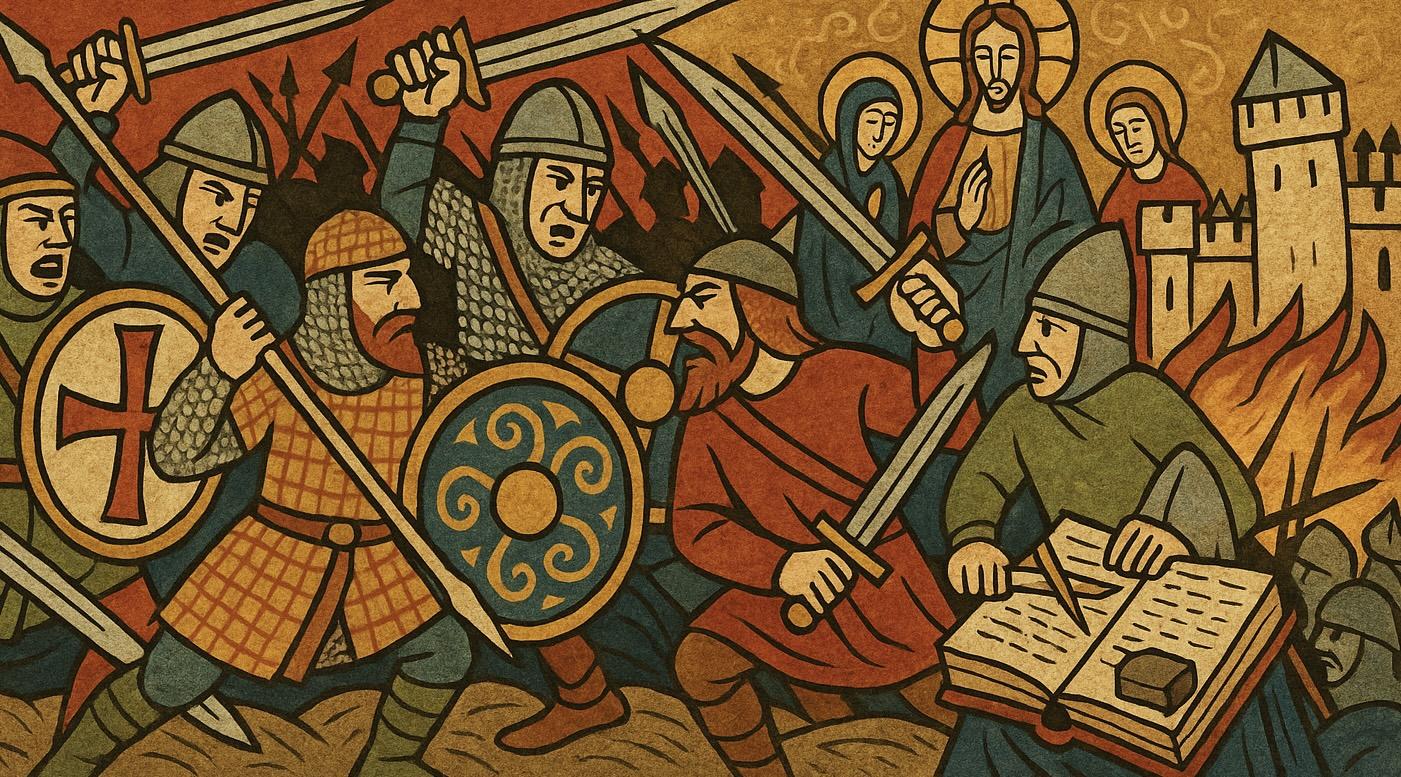
History isn’t clean. It isn’t safe. It isn’t a gallery of ideals polished for display. It’s a graveyard. The stones we admire today—the castles, the cathedrals, the ruins—stood because bodies once broke against them. If you’re going to write historical fiction, you can’t look away from that. To strip out the blood is to strip out the truth.
The Temptation to Soften
Every age has its own temptation. For the medievalist, it’s the shining knight and the holy abbey. For the Victorian writer, it’s the noble patriot and the saintly mother. For the twentieth century, it’s the soldier who dies beautifully for freedom. But history was never polite. Rome was built on crucifixions. The Anglo-Saxon Chronicle matter-of-factly reports villages “harried until nothing remained but ashes and corpses.” The French Revolution wrapped itself in virtue before drowning Paris in blood. The First World War—supposedly the war to end all wars—turned Flanders into a swamp of gas and bone.
When we write these moments without their wounds, we’re not writing history anymore. We’re writing nostalgia in costume.
Violence as Indictment
Here’s the point: violence honestly rendered doesn’t glorify. It indicts. A sword thrust isn’t an adventure flourish—it’s entrails on the rushes. A gunshot isn’t a spark on a cinema reel—it’s bone shattered, silence where breath used to be. That’s why chroniclers didn’t shy away. Orderic Vitalis catalogued hacked limbs. Tacitus counted mangled corpses. Wilfred Owen gave us men “blood-shod” limping through sludge. Aleksandr Solzhenitsyn described hunger gnawing the gulag. If they didn’t avert their eyes, why should we?
More Than Brutality
Still, brutality on its own doesn’t make for good historical fiction. Every age has seen blood as more than biology. In the medieval world, wounds were sacramental signs: every lance thrust echoed Christ crucified in the flesh of soldier and penitent alike. In modern times, blood is testimony: the martyrs of Dachau, the lynched in the American South, the mass graves of Rwanda. Violence always means something. Judgment, penance, sometimes even grace. To write without that horizon—sacramental, moral, existential—is to leave blood meaningless. And that’s as false as pretending it never happened.
Which brings us to two writers who have taken this balance seriously: Dan Jones and Bernard Cornwell.
Dan Jones and the Essex Dogs
Dan Jones is better known as a historian, but in his Essex Dogs trilogy he shows what happens when you take history’s dirt seriously. The Hundred Years’ War was not a parade of banners—it was mud, hunger, and exhaustion. Jones doesn’t hide that. The opening of Essex Dogs throws us straight into Crécy, where soldiers stumble through filth, their stomachs empty, their nerves fraying. You taste the grime and smell the latrines.
But Jones doesn’t drown the reader in gore. He tempers. He lets in flashes of black humor—men mocking each other, telling crude jokes to get through the march. He lets us glimpse friendship and loyalty, the small comforts of bread shared or an insult well-placed. Violence is the backdrop, but not every page is a slaughterhouse. That balance is what makes the blood real.
When men die in Jones’s novels, it’s not cinematic. It’s ugly, awkward, often quick. A sword through the ribs. A fall in the mud. The sudden silence of a joke left unfinished. Readers aren’t asked to thrill at the violence—they’re asked to recognize it, to feel its weight. That’s how historical fiction should bleed.
Bernard Cornwell and the Shield Wall
Bernard Cornwell has been doing this for decades. In The Last Kingdom series, Uhtred takes us into the grind of the shield wall. Cornwell doesn’t flinch: skulls are split, entrails spill, men scream. You feel the claustrophobia of wood and iron pressing against your chest, the hot breath of the man beside you, the sudden collapse when the line breaks.
But Cornwell, too, knows the value of balance. After the carnage, he often gives us a pause—Uhtred’s wry reflection, a moment of silence watching the smoke rise, a bitter laugh over ale. The violence hits harder because it’s framed by humanity. Cornwell knows that if every page is soaked in blood, the reader goes numb. Contrast makes the horror sting.
Take his novel Agincourt. The archery, the mud, the butchery of French knights—it’s relentless. But Cornwell always returns to the archer’s perspective, to the ordinary man scraping mud off his boots, thinking about food, cursing the stink. The battle isn’t just spectacle—it’s lived reality. That’s why it works.
And in the Sharpe series, Cornwell gives us musket smoke and bayonet wounds, but he also gives us Sharpe’s grudges, loves, and survival instincts. Violence matters because it’s never abstract—it’s always personal.
Lessons for Writers
So what do Jones and Cornwell teach us? That historical fiction must bleed, but it must bleed with purpose. Violence must indict, not entertain. It must reveal, not disguise. And it must be set against moments of silence, humor, or reflection—otherwise it dulls into noise.
That balance is what separates fiction that honors history from fiction that merely uses it as a backdrop. Readers don’t need endless carnage, but they do need honesty. They need to see the cost. They need to smell the smoke, hear the silence after the crack of the rope, feel the ash settling after the fire.
The Writer’s Burden
So yes—historical fiction needs to bleed. Not for shock. Not for titillation. But because truth is costly, and history demands witness. Our job isn’t to comfort the reader; it’s to confront them. To place them in the smoke-choked hall, the slave ship’s hold, the trench at Passchendaele. To let them hear the gasp of the soldier falling from the wall, the groan of a knight pinned in the mud, the bitter laughter of survivors around the fire.
Writers like Jones and Cornwell remind us: balance matters. Violence must cut deep, but it must also mean something. Only then can fiction echo the world it seeks to reimagine. Only then can it bear history’s cruciform burden.